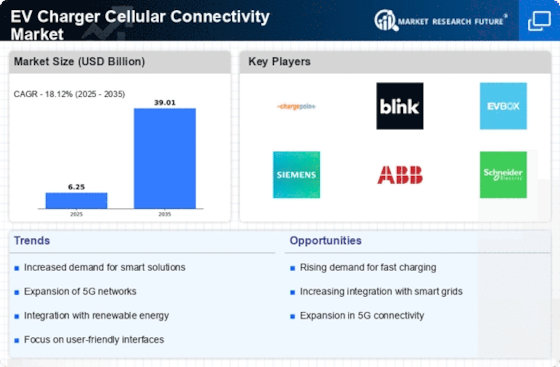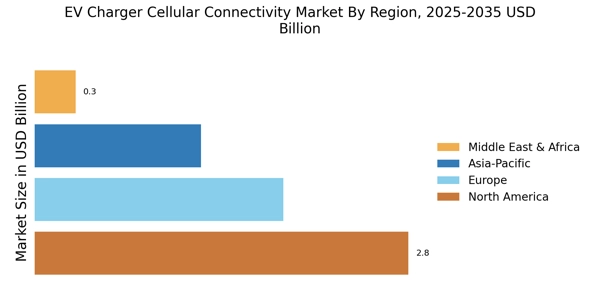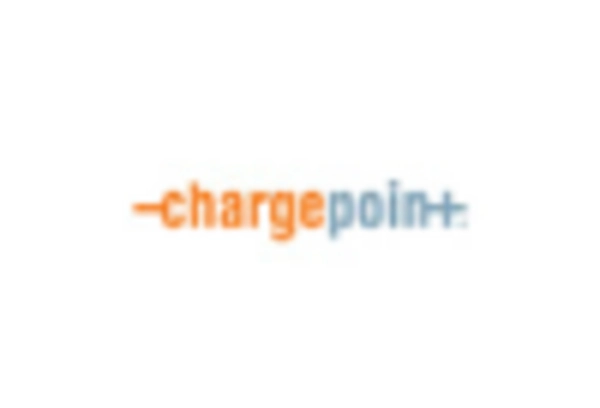Rising Demand for Electric Vehicles
The increasing adoption of electric vehicles (EVs) is a primary driver for the EV Charger Cellular Connectivity Market. As consumers become more environmentally conscious, the demand for EVs is projected to rise significantly. According to recent estimates, the number of electric vehicles on the road is expected to reach over 30 million by 2030. This surge in EV adoption necessitates a robust charging infrastructure, which in turn drives the need for advanced cellular connectivity solutions. Enhanced connectivity allows for real-time monitoring, remote diagnostics, and efficient energy management, thereby improving the overall user experience. The EV Charger Cellular Connectivity Market is thus poised for growth as manufacturers and service providers seek to meet the evolving needs of EV users.
Expansion of Charging Infrastructure
The expansion of charging infrastructure is a significant driver for the EV Charger Cellular Connectivity Market. As the number of electric vehicles increases, the need for accessible and efficient charging stations becomes critical. Investments in charging networks are on the rise, with projections indicating that the number of public charging stations could exceed 1 million by 2030. This growth necessitates the implementation of cellular connectivity solutions to ensure that charging stations can communicate effectively with users and energy management systems. Enhanced connectivity allows for features such as real-time availability updates, payment processing, and remote monitoring, which are essential for a user-friendly charging experience. Consequently, the expansion of charging infrastructure is likely to propel the demand for cellular connectivity in the EV charging sector.
Government Incentives and Regulations
Government policies and incentives play a crucial role in shaping the EV Charger Cellular Connectivity Market. Many countries are implementing stringent regulations aimed at reducing carbon emissions, which encourages the transition to electric vehicles. For instance, various governments offer tax credits, rebates, and grants to both consumers and businesses investing in EV infrastructure. These initiatives not only promote the adoption of electric vehicles but also stimulate the demand for advanced charging solutions equipped with cellular connectivity. As regulatory frameworks continue to evolve, the market for EV chargers with cellular capabilities is likely to expand, providing opportunities for innovation and investment in this sector.
Growing Focus on Renewable Energy Integration
The integration of renewable energy sources into the EV charging ecosystem is becoming increasingly important, thereby impacting the EV Charger Cellular Connectivity Market. As more charging stations incorporate solar panels and wind energy, the need for reliable cellular connectivity becomes paramount. This connectivity enables real-time data exchange between charging stations and energy providers, facilitating efficient energy distribution and usage. Moreover, the ability to monitor energy consumption and production helps in optimizing the charging process, making it more sustainable. The push towards renewable energy not only enhances the appeal of electric vehicles but also drives the demand for advanced cellular connectivity solutions in the charging infrastructure.
Technological Advancements in Connectivity Solutions
Technological innovations are significantly influencing the EV Charger Cellular Connectivity Market. The advent of 5G technology, for instance, is set to revolutionize the way EV chargers communicate with vehicles and the grid. Enhanced data transfer speeds and lower latency will enable more efficient charging processes and improved user interfaces. Furthermore, advancements in Internet of Things (IoT) technologies facilitate seamless integration of charging stations with smart city infrastructure. This interconnectedness allows for better energy management and optimization of charging schedules. As these technologies continue to develop, they are likely to drive the demand for cellular connectivity in EV chargers, thereby propelling the market forward.

















